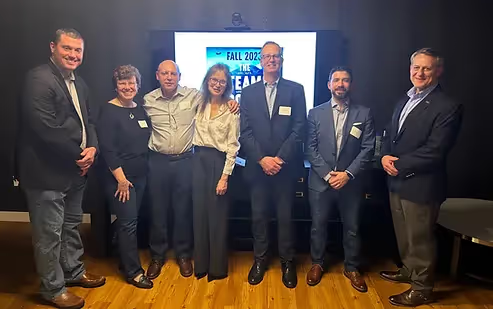FedTech Mentor and Playwright Bill Raskin Discusses Career Transition
Following an exciting reading of Bill Raskin's play The Team Room, based on his experience in the armed forces during 9/11, FedTech sat down with him to learn about his career during and after his time in the U.S. Military. He also discusses why he became a FedTech mentor and why he's excited about the future of Deep Tech.

Q: Can you tell us a bit more about your background? Why did you decide to pursue a career in the Army and in the Special Forces?
A: Sure, so I was born and raised in Dallas, Texas. I went to Georgetown undergrad, and — probably like a lot of people in the armed services — I needed a way to pay for college. So, it was very much a scholarship mechanism starting out, for which I could never have been more grateful. Then like a lot of folks who join via that path, you get in and you start to meet amazing people, and find some incredible mentorship. That really got me started on the path of my 20-year career.
Q: In your Army career, how much impact did innovative technology have on your mission objectives or mission success? How important is Army modernization to the Special Operations Community?
A: That's a great question. I'll add on — I forgot to mention this Special Forces piece, because it very much ties into the question on innovation and modernization. If there was one common denominator in the military career, I think it’s common for most folks who join the Special Operations community to be drawn to challenges. They’re thinking, "Where's the next challenge? Where do you find pockets of really dynamic people?" That tends to be the most rewarding place to serve. It was always an intense curiosity that drove me to try the next election course, the next unit, and that takes you deeper into the Special Operations career.
Then, to the point of innovation, I think over the span of the career when I served — which was essentially the early 1990s, through 2011 when I retired — it was ever-changing. You can define the first third of that as very much an analog environment. You did have satellite radios, but everything was getting passed by analog – you had to write down what was going on. Once 9/11 hit and the acceleration of operations when digital technology was coming into its own, it really was an environment where, from one deployment to the next, you had to be open and adaptable to leverage new technology and new equipment. Every time you turned around, there would be something new that changed your operational environment.
Q: After retiring from the military, what secondary career paths did you consider, and what did you decide to pursue?
A: In FedTech's world, I know it's a very agile atmosphere, and that was a great lesson for me. I retired, very much expecting I would do a second 20-year lap as a government civil servant of some flavor. And what I found — in my first year or two of looking at different hiring pathways — was that I was very well-received, but there's not always a lot of agility in where you may plug in and have the opportunity to move around. So what I found was that staying in the consulting ranks was a better fit for me.
Q: You are also a published author, having written the fiction novel, Cardiac Gap, in 2019 and The Team Room play last year. Can you share what your motivation was for becoming a writer, and for writing The Team Room? Can you tell us a bit about the story?
A: In terms of the writing, it probably tracks a lot with the rapid pace of change. Certainly, the back half or past 20 years now of my career — 9/11 until now — change was at an intensity and speed that was very difficult to process at the time. So, I think my initial curiosity to write was a personal mission, just to try and digest and make sense of what those changes meant to me. I think as humans, we're always trying to put into context and understand what it means for us as human beings to go through periods of incredible change. And that's what I always hope — if I can convey anything — maybe I can give the audience a sense of what it felt like to live through certain periods of rapid change at a time when there were some really important things that we needed to deal with as a country.
In terms of The Team Room, for me, that was very much about the mid-career experience where it was at that pivot point from what had been the 1990s and a fairly stable time in our national security community. Then, all of a sudden, the upheaval and the unexpectedness of 9/11 and the process of really going from becoming what I would call an apprentice special operator, who had a lot of the tools — but not necessarily all of the experience — to manage everything that's coming at you — then that process of becoming what is expected in the community. At some point, you become a veteran operator, not only able to get yourself through one mission to the next, but then really able to pick up and serve as a source of mentorship and leadership for others.
Q: How challenging is the process of bringing a written play to the stage? What does that process look like?
A: It's certainly a first rodeo for me, so that makes it very challenging and probably mimics a lot of the FedTech environment of the startup. That's what it feels like to me: starting up a new task force, starting up new efforts that I've been a part of in a second career.
So, as with any first experience, I think the most important thing is finding a good team. This is my first run to stage, but our director, Ray Ficca, and our producer, Michael Hare, have just been incredible mentors. Jim Linder, the retired SF general officer, is very much a senior mentor in the veterans' community because we know we touch a big part of that community with the story. And then our board — Kate Miller, Christina Swatek, Tony Nyberg, Will Clancy — each one of them just brings an incredible amount of leadership. As we deal with every month — big lists of unknowns for me — there's someone on our team who can help me understand where we need to go.
Q: If Hollywood decides to make a movie about Bill Raskin's Army career, who should play Bill Raskin?
A: Here's what I'd say: I don't even know that you would recognize the role if you did a movie because it would be such an ensemble cast of thousands – because the thing you learn pretty quickly in the Special Operations community is that the community and the collective talent get you where you need to go. Then, you learn that if you're going to succeed, it's really by how you make yourself a very small value-added member of a very dynamic community.
Q: The proceeds of the play are going to the Special Operations Warrior Foundation. Can you tell us more about the Foundation and its mission?
A: Yes, so the net proceeds will go — as you said — to the Special Operations Warrior Foundation. It's been in existence since the early 1980s after the Tehran hostage crisis when the community took some very painful casualties. They guarantee what they call cradle-to-career: educational scholarships and related support and counseling for the children of any warrior – for the children of any special operator who died in the line of duty. And they have also now covered that support for the children of Medal of Honor recipients. It's a critical function.
The community has taken a lot of casualties over the past 20 years. As General Linder said in remarks at The Team Room reading held at FedTech’s offices, there are currently 990 children of various ages on the rolls who are due to receive, receiving, and will receive lifetime support from the program.
Q: In addition to your consulting work on national security and your role as an author and playwright, you also decided to volunteer as a mentor for FedTech. What motivated you to do that? What can you share with entrepreneurs who are new to the Defense Department about breaking into the defense innovation space?
A: In a lot of ways, I'd say that FedTech approaches the technology and startup community mirrors some of the Green Beret mission, which is to be a force multiplier. So what I've seen so far is that FedTech really has a great focus to understand the landscape of US government requirements and research that may not always be understood by the larger public. FedTech has become very good at finding and mentoring talent – whether creating connections to get cutting-edge research in the civilian sector into the government – or helping get federally-driven research and innovation out to the larger community that can make use of it. So I think it's a fantastic mission; I've really enjoyed getting to know FedTech.
I think in the Special Operations community — though I'm not a technologist — everything you do is on a startup model. You custom-build each deployment, each mission you often custom-build your team each time. I'm happy to share whatever I can of US government knowledge, and then also happy to contribute wherever I can to that process.
Q: If you were to decide to add yet another professional vocation to your busy life and become a tech startup founder, what kind of technology would you develop? What big problem would you want your technology to solve?
A: You know what strikes me as a consumer and a non-technology expert? There are two broad paths; one is AI and the early stage we are probably still in as far as understanding what AI is going to do to the world — how we make decisions, how we work as teams and individuals, it's probably most akin to the early days of electricity. So, I'm really fascinated to see where that goes and stay plugged in with places like FedTech because I want to be on the inside as you watch those develop.
In terms of material solutions, I think — if you look at my background for the military — we're very much still coming out of a large footprint model, where we had the luxury of building large infrastructure, large bases, everywhere we went. We now know that very much needs to be disaggregated. I think you can watch the conflict in Ukraine, you can watch a lot of the dispersion of footprint being worked on in the Pacific. And I think anything that finds a material solution in those environments is going to be value-added.
Probably the last thing I'd add on the material side is you'll learn really quickly that anything that can serve multiple uses will justify its weight to get on an aircraft or go downrange. And a lot of times, the niche products — they're great, but you can't justify hauling them all over the world with you.
Q: If you decide to write another book or play after this one, what do you think about writing about a plucky technology innovation company called FedTech and the hero’s journey that this company pursues, overcoming countless challenges and insurmountable odds to become the world’s leading Deep Tech platform? Would that be a good story? We would love to see it.
A: I love it. Let's do it.
Recent Posts
Link has been copied.





